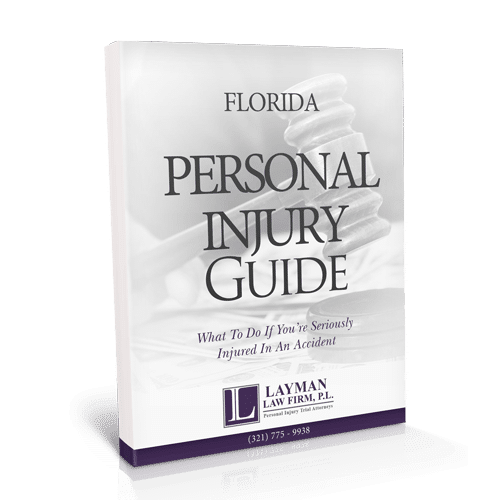Melbourne Traumatic Brain Injury Lawyers
A traumatic brain injury (TBI) can cause life-altering physical injuries for the victim that can result in a lifetime of financial repercussions. According to the Centers for Disease Control and Prevention (CDC), an average of 176 people die each day and over 200,000 people are admitted to the hospital each year because of a TBI-related injury. Sadly, many TBI injuries could have been prevented. When that is the case, a victim or the surviving family members of a fatally injured victim may be entitled to compensation from the at-fault party (or parties).
The experienced Melbourne traumatic brain injury lawyers at Layman Law Firm, P.L. are dedicated to helping TBI victims and surviving family members pursue accountability and compensation from the party (or parties) whose negligence caused or contributed to the traumatic brain injury.
What Is a Traumatic Brain Injury?
As the name implies, a traumatic brain injury can be an extremely serious, even life-threatening, injury to your brain. The CDC defines a traumatic brain injury as “a disruption in the normal function of the brain that can be caused by a bump, blow, or jolt to the head, or penetrating head injury.” A TBI injury can cause the brain to bounce around or twist in the skull as well as lead to chemical changes in the brain and/or the stretching and damaging of brain cells. A TBI injury can be categorized as mild, moderate, or severe, characterized as follows:
- Mild. Commonly referred to as a concussion, a mild TBI may cause a short loss of consciousness or no loss of consciousness at all. Although not typically life-threatening, a victim may still experience serious symptoms, and repeated mild TBIs can cause lasting damage to the brain.
- Moderate. A moderate TBI causes changes in brain function that last for longer than a few minutes and typically results in a loss of consciousness for some time. Symptoms may be similar to mild TBI, but the symptoms do not go away or may even get worse.
- Severe. A severe TBI is marked by an extended period of unconsciousness (coma) or amnesia that also causes a wide range of changes in brain function, motor function, sensory function, and emotional state. These changes may last for a relatively short time or be long-lasting.
What Are Some Common Causes of Traumatic Brain Injuries?
Although a traumatic brain injury can occur under a wide variety of circumstances, there are some common causes. According to the latest CDC report, the most common TBI causes include:
- Falls. Falls are the number one cause of TBIs and account for almost half of all TBI-related emergency department visits. Younger (under 17) and older (over 65) victims are more likely to suffer TBI related to a fall.
- Being struck by or against an object. Almost one in five emergency room visits for a TBI is caused by the head being struck by or against an object. Injuries that occur in the workplace or while playing sports frequently cause these types of TBIs.
- Motor vehicle crashes. Motor vehicle crashes account for 20 percent of TBI injuries requiring hospitalization and are a leading cause of death for TBI deaths in children.
- Firearms and assault. Self-inflicted TBI injury from a firearm and intentional assault are also leading causes of TBI deaths and serious injury.
How Do I Know If I Have a Traumatic Brain Injury?
Among the most troubling aspects of a traumatic brain injury is the elusive nature of the symptoms. A victim may not experience those symptoms immediately. In fact, it may be hours or days after the injury that obvious symptoms appear. In the meantime, life-threatening and/or irreversible damage could occur to the victim’s brain. Because the diagnosis of TBI can only be made by a competent physician after a thorough examination and diagnostic testing, any trauma to the head should be followed by an immediate visit to the emergency room. Symptoms that may be experienced at some point by the victim of a traumatic brain injury include:
- Loss of consciousness for any amount of time
- Headache that will not go away or that gets worse
- Balance or coordination problems
- Nausea or vomiting
- Light sensitivity, blurry vision, and/or dilation of the eye(s)
- Convulsions or seizures
- Memory loss or problems concentrating
- Trouble sleeping or sleeping too much
- Personality changes, including mood swings
What Is the Long-Term Prognosis for a Traumatic Brain Injury?
The long-term prognosis for the victim of TBI depends on several factors, including the severity of the TBI and how quickly the injury is diagnosed and treated. Because the onset of symptoms from TBI can be delayed, a thorough medical examination should be conducted immediately following any trauma to the head. Imaging tests such as an MRI or CT scan along with a neurological examination utilizing the Glasgow Coma Scale (GCS) may be used to diagnose a presence and severity of a traumatic brain injury. Left undiagnosed and treated, TBI can cause the brain to swell from lack of oxygen and blood supply, leading to irreversible brain damage.
The economic costs associated with diagnosing and treating a traumatic brain injury can be staggering. According to a 2019 study conducted by the National Institutes of Health, in-hospital costs per patient for TBI ranged from $2,130 to $401,808. Another study by the CDC found that only 26 percent of people with moderate-to-severe brain injuries improved within five years. The remaining 74 percent remained the same (22 percent), worsened (30 percent), or died from their injury (22 percent).
The financial cost of treating long-term TBI symptoms can be devastating for a victim and his or her family. Common direct and indirect expenses related to ongoing treatment for a traumatic brain injury include:
- Specialist doctor visits
- Occupational, speech, and physical therapy
- Prescription medications
- Wheelchair or other medical equipment
- In-home health aid
- Long-term care facility costs
- Home modifications
- Lost earning capacity
- Counseling for emotional trauma
- Diminished quality of life
Am I Entitled to Compensation for My Melbourne Traumatic Brain Injury?
When a traumatic brain injury was caused, entirely or partially, by the negligent or wrongful conduct of another party, a victim or surviving family member may be entitled to compensation from the at-fault party (or parties). This may include compensation for both economic and non-economic damages. Economic damages represent the direct, easily identifiable costs related to the injury, such as:
- Medical expenses, including doctor, hospital, and therapist expenses
- Rehabilitation, in-home care, and long-term care costs
- Lost income or loss of earning capacity
- Specialized medical equipment
Non-economic damages represent the subjective, difficult to quantify expenses related to a traumatic brain injury and may include:
- Pain and suffering
- Emotional distress
- Loss of enjoyment of life
- Disfigurement
- Mental anguish
- Loss of consortium
The surviving spouse or child of a victim who suffered a fatal traumatic brain injury may be entitled to compensation for the loss of the companionship, care, and support that was provided by a spouse or parent prior to the TBI through a wrongful death lawsuit.
Contact the Experienced Melbourne Traumatic Brain Injury Lawyers at Layman Law Firm, P.L.
If you suffered a traumatic brain injury, or you lost a family member because of a fatal TBI, contact the experienced and compassionate Melbourne traumatic brain injury lawyers at Layman Law Firm, P.L. to discuss your legal options. Contact the team today for your free initial consultation by calling 321-773-2111 or by filling out our convenient Intake Evaluation Form online.






